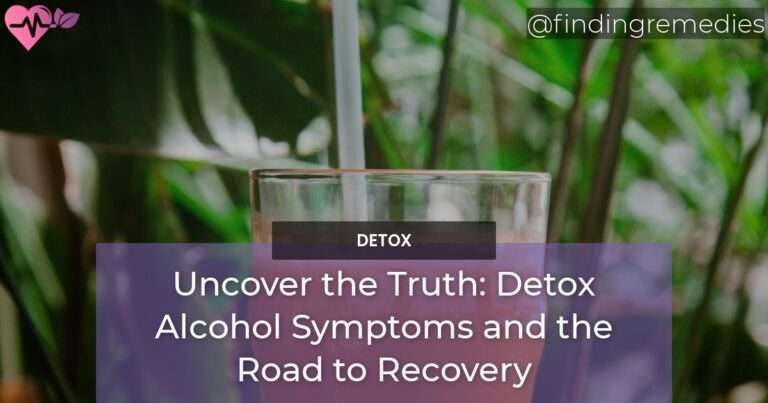If you or someone you know is struggling with alcohol addiction, it’s important to understand the process of alcohol detoxification, including detox alcohol symptoms that can arise during the process.
This comprehensive guide will provide you with everything you need to know about alcohol detox, including timelines, detox alcohol symptoms, and post-detox care.
Table of Contents
Understanding Alcohol Detoxification
What Happens During Alcohol Detoxification
Alcohol detoxification is the process of removing alcohol from the body. During detox, the liver works to break down and eliminate alcohol from the body. This process can lead to alcohol withdrawal symptoms as the body readjusts to functioning without alcohol. Detox can be a challenging process, and it’s important to have medical supervision and support throughout the process.
When Does Alcohol Detox Start
Alcohol detox typically begins within 6-12 hours after an individual’s last drink. However, in some cases, withdrawal symptoms can begin as early as 2 hours after the last drink. It’s essential to seek medical attention as soon as possible to ensure a safe and effective detox process.
Alcohol Detox Timeline
The alcohol detox timeline can vary depending on the individual’s level of alcohol addiction and the severity of withdrawal symptoms. The timeline can be broken down into three stages:
- Stage 1 (6-12 hours): Mild withdrawal symptoms, including nausea, headache, and anxiety
- Stage 2 (1-3 days): Moderate withdrawal symptoms, including increased heart rate, high blood pressure, and confusion
- Stage 3 (3-7 days): Severe withdrawal symptoms, including seizures, hallucinations, and delirium tremens (DTs)
Alcohol Withdrawal Symptoms
Acute Alcohol Withdrawal
Acute alcohol withdrawal symptoms typically occur within the first week after an individual stops drinking. These symptoms can include:
- Anxiety
- Nausea
- Vomiting
- Headache
- Sweating
- Shaking
- Insomnia
Post-Acute Withdrawal Syndrome (PAWS)
Post-acute withdrawal syndrome (PAWS) can occur weeks or even months after an individual stops drinking. Symptoms of PAWS can include:
- Anxiety
- Depression
- Irritability
- Fatigue
- Difficulty concentrating
Alcohol Withdrawal Symptoms Timeline
The alcohol withdrawal symptoms timeline can vary depending on the individual’s level of alcohol addiction and the severity of withdrawal symptoms. The timeline can be broken down into three stages:
- Stage 1 (6-12 hours): Mild withdrawal symptoms, including nausea, headache, and anxiety
- Stage 2 (1-3 days): Moderate withdrawal symptoms, including increased heart rate, high blood pressure, and confusion
- Stage 3 (3-7 days): Severe withdrawal symptoms, including seizures, hallucinations, and delirium tremens (DTs)
ALSO READ
Detoxing from Alcohol: Process and Complications
Alcohol Detox Process
The alcohol detox process involves removing alcohol from the body and managing withdrawal symptoms. The process typically includes:
- Medical supervision and support
- Medications to manage withdrawal symptoms
- Fluid and electrolyte replacement
- Nutritional support
Medical Detox for Alcohol
Medical detox for alcohol involves detoxing from alcohol under the supervision of medical professionals. This process can involve the use of medications to manage withdrawal symptoms and prevent complications.
Home Detox for Alcohol
Home detox for alcohol involves detoxing from alcohol without medical supervision. This process can be dangerous and is not recommended. It’s always best to seek medical attention for alcohol detox.
Detox Complications
Detox complications can occur during the detox process, including seizures, hallucinations, and delirium tremens (DTs). These complications can be life-threatening and require immediate medical attention.
Post-Detox Care
Alcohol Detox Diet
An alcohol detox diet can help support the body during the detox process. It’s important to eat a diet rich in nutrients, including fruits, vegetables, and lean protein.
Alcohol Detox Medication
Medications can be used to manage withdrawal symptoms during the detox process. It’s important to work with a medical professional to determine the best medication for your needs.
Alcohol Detox Remedies
There are many natural remedies that can help support the body during the detox process, including herbal teas, acupuncture, and massage.
Alcohol Detox Therapy
Therapy can be an important part of the post-detox process, helping individuals address underlying issues that may have contributed to their alcohol addiction.
Alcohol Detox Protocol
Alcohol detox protocols typically involve medical supervision and support, medications to manage withdrawal symptoms and nutritional support. It’s important to work with a medical professional to determine the best protocol for your needs.
Alcohol Detox Centers
Alcohol detox centers can provide medical supervision and support during the detox process. These centers can also provide access to therapy and other post-detox support services.
Alcohol Detox Side Effects
Side effects of alcohol detox can include headaches, fatigue, and irritability. These side effects typically subside within a few days or weeks after the detox process is complete.
By following this guide, you can understand what happens during alcohol detox, when it starts, and the timeline for the process. Additionally, you’ll learn about the various alcohol withdrawal symptoms that you may experience, as well as the acute and post-acute withdrawal syndrome. It’s important to be aware of the process of detoxing from alcohol, including the potential complications that can arise, whether you’re pursuing medical detox or attempting to detox at home. Finally, you’ll find post-detox care tips, including information on diet, medication, remedies, therapy, protocol, centers, and potential side effects.

